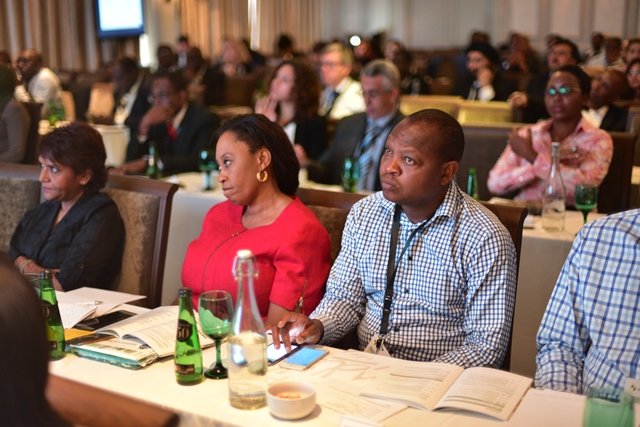The African Export-Import Bank (Afreximbank) is establishing a “Fund for Africa Export Development” to help African countries respond to the recurrent adverse economic shocks that have affected the continent, participants in the Bank’s Annual Structured Trade Finance Seminar and Workshop taking place in Port Louis in Mauritius have heard.
Dr. Hippolyte Fofack, Chief Economist of the Bank, making one of the presentations at the four-day seminar and workshop series which opened on 21 November, said that the new fund would have both debt and equity options in order to promote industrialization and export diversification and, ultimately, reduce recurrent exposures to adverse commodity price and terrorism-induced shocks.
In the presentation titled “Commodity Price and Terrorism-Induced Shocks: Implications for African Trade and Trade Finance”, Dr. Fofack said that the Bank was also working on a mobile payment platform to enhance intra-African trade. That platform would incorporate a clearing mechanism that would reduce the trade costs associated with the scarcity of foreign currency.
“The Bank is aggressively putting emphasis on the promotion of intra-African trade and industrialization and export development as part of its long-term strategy for business and development, and to ensure that member countries are sufficiently equipped to cope with global shocks and recurrent adverse terms of trade,” he explained.
In another presentation, Gwen Mwaba, Director of Trade Finance at Afreximbank, speaking on Understanding the Basic Techniques of Structuring Trade Finance Transactions, said that the role of structured trade finance in risk mitigation lay in the transfer of risk in financing transactions from parties less able to bear those risks to those more equipped to bear them in a manner that ensured automatic reimbursement of advances from the underlying transaction assets.
According to her, structured trade finance converts uncertainty to some certainty (with predictable cash-flow), thereby mitigating risks. It also made unbankable deals to become bankable.

Other speakers, so far, have included Geoffrey Wynne, Partner, Sullivan & Worcester UK LLP, who spoke on “Supply chain versus Structured Trade Finance: Similarities, Differences and Optimal Approach,” and on “Legal, Regulatory and Institutional Issues in Documenting and Implementing Structured Trade and Commodity Finance Deals”; Charles Corbett, Managing Director at Standard Chartered Bank, on “Financing In Turbulent Markets”; Kenneth Aigbinode, CEO of Vintage Vantage Advisory, Canada, on “Warehousing and Collateral Management Structures for Managing Commodity Financing Risks”; and Mike Marnell, a structured trade finance consultant, who spoke on “Trade-Backed Term Financing Deal Structures, Principles, Challenges and Benefits”.
Dr. Hassan Abdallah Aly Salem, Under-Secretary at the Egyptian Tax Authority; Shaileen Sreekeessoon, Head of Strategy, Research and Innovation at SBM Holdings, Mauritius; Ayodipo Ogunmoyela, Head of Structured Trade Commodity Finance, First Bank, United Arab Emirates; and Armin Eckerman, Managing Partner at Eckerman and Partners, Malta, also made presentations.
The seminar and workshop was declared open by Rameswurlall Basant Roi, Governor of the Central Bank of Mauritius, while Kee Chong Li Kwong Wing, Chairman of SBM, gave a welcome statement and Afreximbank President Dr. Benedict Oramah delivered a keynote address.
The close to 200 participants from 22 countries include senior executives from African banks and financial institutions, regulatory institutions, hedge funds, Africa country funds and venture capital institutions, corporate entities engaged in trade, manufacturing and privatized infrastructure projects, Afreximbank’s trade finance and project finance intermediaries, African law firms and insurance firms are among participants expected at this year’s seminar.
The four-day training started today with the two-day Structured Trade Finance Seminar, to be followed on 23 November by a workshop on agency and syndications. A second workshop, titled “Making factoring work for Africa,” will take place on 24 November, with the objective of raising awareness of factoring as an alternative trade finance tool in Africa.
The holding of the Trade Finance Seminar and Workshop is part of Afreximbank’s effort to prepare African banks and financial institutions to meet the trade finance needs of the continent and is being organised in co-operation with the Central Bank of Mauritius and SBM.

Trade Finance Seminar and Workshop in Port Louis, Mauritius

